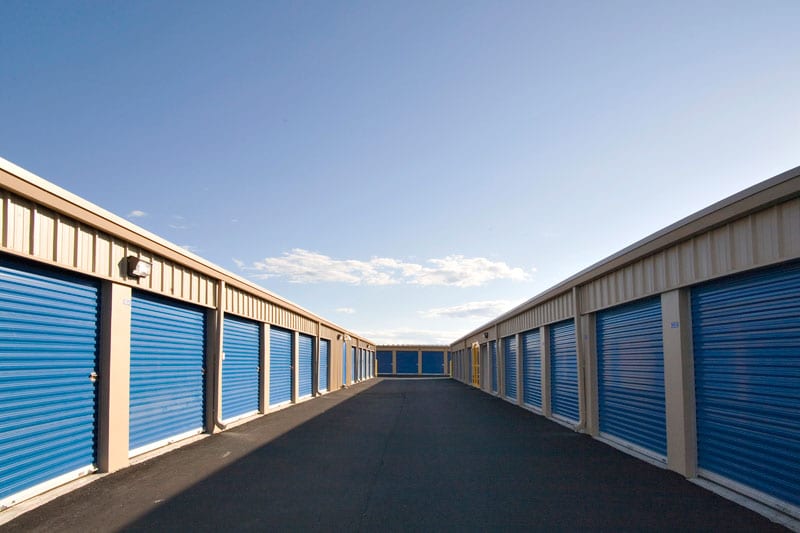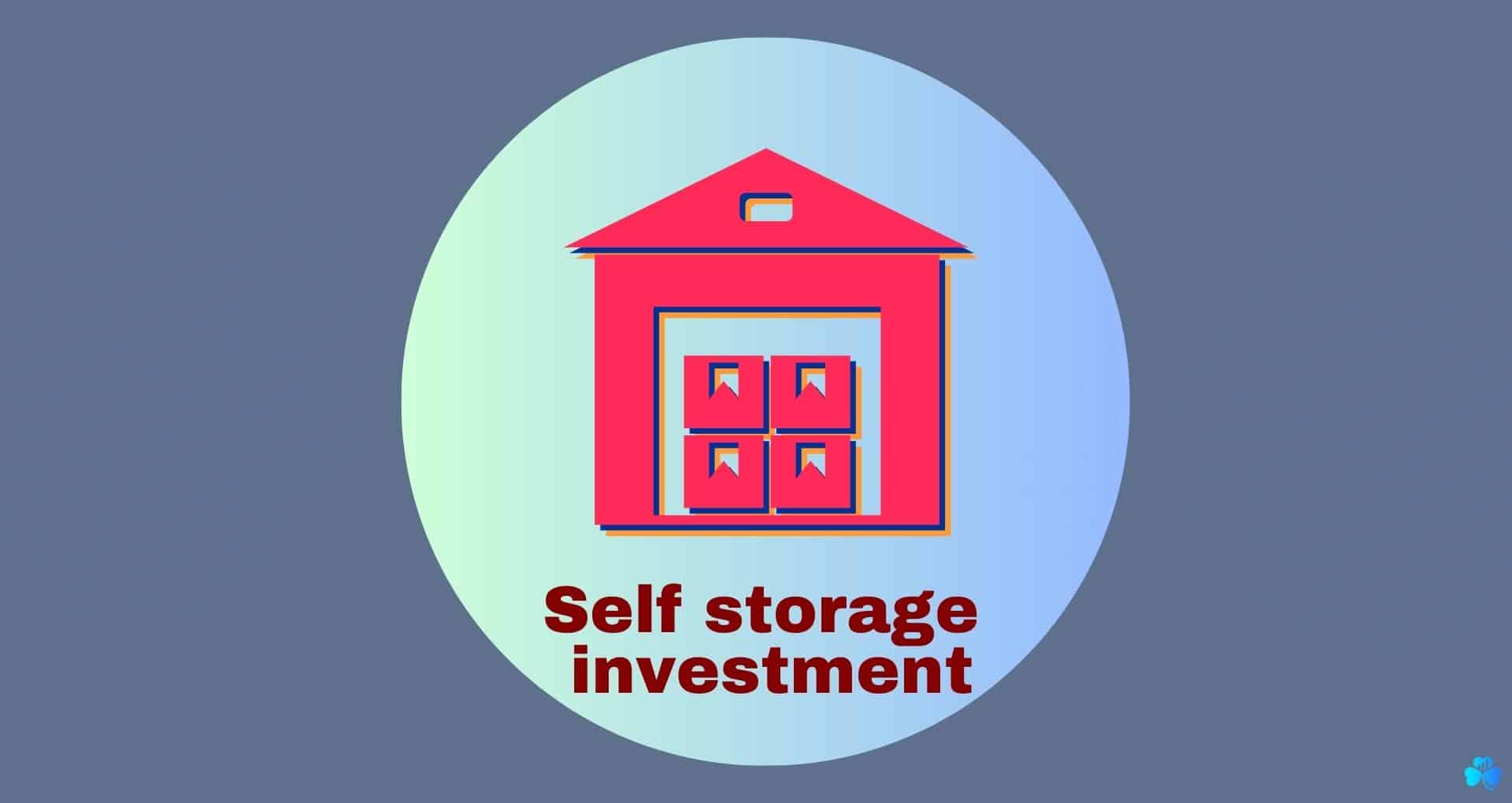If you're seriously considering investing in the booming self-storage industry but aren't sure where to start; this article- Self Storage Investment, will guide you through the steps to launch your own successful self-storage venture.
Self storage investments have become increasingly popular and profitable, due to the economy and e-commerce therefore many consumers and businesses need self-storage.
These assets can be forged into long-term, passive revenue sources, with the right plan.
So let us welcome you to the world of self-storage hustle.
This article might contain referral links from our chosen partners, that may bring us a small commission at no additional cost to you. Please read our disclosure page for more details.
Why Invest In Self Storage?

Consider investing in the self-storage sector for the following reasons:
► Self-storage provides real estate investors with distinct alternative asset classes and is a terrific way to diversify your investment portfolio.
► Self-storage is anticipated to see an increase in demand as more individuals downsize their homes, making it an attractive investment option.
► With the rise of e-commerce, more businesses require storage space for inventory, providing an additional market for self-storage facilities.
► Investing in self-storage can offer flexibility, allowing self-storage investors to choose how hands-on they want to manage their investment, from hands-on management to passive investment options or even leasing units.
► Self-storage investments are resilient during economic downturns compared to some other asset classes, making them a reliable investment option during uncertain times.
Understanding Self-Storage Classes
Understanding the various sorts of storage facilities is crucial if you want to invest in self-storage.

The available classes depend on the age of the building and the amenities and services offered. These are the three types of self-storage available:
Class A Facilities
- These are newly built facilities, typically less than 10-15 years old.
- In prestigious locations with cutting-edge features like climate-controlled storage units, cutting-edge security systems, and cutting-edge management software.
- High occupancy rates due to the superior facilities and services provided.
Class B Facilities
- These facilities are over 15 years old and offer moderate amenities and maintenance.
- They may not have climate-controlled storage units or round-the-clock maintenance services.
- The rental rates for these units are average.
Class C Facilities
- Older storage facilities located in non-prime locations are classified as C-class.
- They offer limited amenities and services, and the security measures may not be up to par.
- Rental rates for these units are low.
Prior to making an investment decision, it is critical for investors to assess the characteristics and facilities of each facility class.
Knowing the distinctions between each class will help you choose the ideal investment opportunity based on your goals and preferences.
Types Of Self Storage Investment Understanding Your Options:
Climate Controlled Storage
Storing certain items can be difficult when they are sensitive to heat, cold, and humidity.
Protecting them from climatic changes is vital, so many people opt for climate-controlled storage units.

Due to their capacity to maintain a stable environment and preserve items in good condition, these units are growing in popularity.
The cost of climate-controlled storage units is typically higher than that of standard storage facilities.
But for the peace of mind that comes from knowing where their possessions are kept, people are willing to pay more.
Student Storage
In the case of student storage units often offer short-term solutions for students who need to store their belongings over the summer or during studies abroad.

This includes clothing, bedding, textbooks, electronics, and furniture.
By adding student storage to their list of services, these units can attract a wider range of customers, and help students who need a safe place to store their belongings during school breaks.
Business Storage
For businesses of all sizes, from big box stores with lots of inventory to small home-based operations, self storage units are the perfect answer.

With limited space or no storefront, having a secure place to store valuable business items is crucial.
Using these units allows businesses to manage and operate their business while reducing costs on commercial spaces.
A business storage unit also frees up valuable space within the business's current location.
Vehicle Storage
Self-storage facilities that offer vehicle storage are the perfect solution for those who possess an additional vehicle.
Customers that require short- or long-term storage for their automobiles, trucks, motorcycles, boats, recreational vehicles, or other vehicles will find it to be useful.
Ensuring the safety of these vehicles is crucial when choosing a storage location.
How to Invest In Self Storage

There are various ways to invest in self-storage, and they can all be profitable.
Below, we will provide an overview of these two options that offer investment opportunities in the self-storage industry.
Option 1: Self-Storage REITs
Self-storage REITs (real estate investment trusts) are one of the most well-liked avenues for self-storage investment. A REIT is a company that owns and operates income-producing real estate.
By investing in a REIT, you can own a piece of an extensive portfolio of properties without having to buy and manage them yourself.
Advantages:
The following are some benefits of investing in self-storage unit REITs:
- Diversification: You can spread your risk by investing in a REIT, which allows you to purchase a variety of properties.
- Income: The requirement that REITs release at least 90% of their taxable income to shareholders in the form of dividends can guarantee a consistent flow of income.
- Liquidity: Since REITs are traded on stock exchanges, quick purchases and sales are possible.
- Professional management: The properties owned by the REITs are managed by experienced self storage operators , which can lead to higher occupancy rates, better pricing, and overall better returns.
- Low barrier to entry: Investing in self storage REITs does not require a large amount of capital, making it accessible to individual investors.
Risks and Difficulties
- Dividend cuts: Although self storage REITs are required to distribute at least 90% of their taxable income to shareholders in the form of dividends, there is no guarantee that the dividends will remain consistent or grow over time.
- Concentration risk: Even though investing in a REIT provides diversification, if a significant portion of the REIT's properties are in one geographic area or have a similar type of clientele, there is a concentration risk that may negatively impact returns.
- Understanding self-storage real estate market trends: To make calculated decisions, self-storage investors need to keep up with the trends and dynamics of the self-storage industry.
Popular Platforms:
- One popular investment platform that offers REITs is Robinhood. Investors can purchase shares in publicly traded real estate investment trusts such as the Vanguard Real Estate ETF (VNQ) or the Schwab U.S. REIT ETF (SCHH) through the Robinhood app.
- Another investment platform that offers REITs is Fidelity Investments. Fidelity offers a wide range of REIT investments, including the Fidelity MSCI Real Estate ETF (FREL) and the Cohen & Steers Realty Shares (CSRSX) mutual fund.
Option 2: Individual Self-Storage Stocks
Another way to invest in public storage is to buy stocks in companies specializing in self storage.
This can be a riskier option than investing in REITs, as the company's success is tied to the performance of its individual self storage properties rather than a diversified portfolio.
However, it can also offer higher potential returns.
Advantages:
- Greater Potential Returns: Individual self storage stocks may offer greater potential returns than self storage REITs, as their success is not tied to the entire industry's performance.
- Flexibility: Investing in individual self storage stocks allows investors to choose which companies they want to invest in based on their individual preferences and risk tolerance.
- Control: Investing in individual self storage stocks gives investors more control over their investments since they can choose when to buy and sell stocks.
- Lower Fees: Investing in individual self storage stocks typically involves lower fees than investing in self storage REITs.
- Greater Transparency: Investing in individual self storage stocks provides greater transparency, as investors can review a company's financial statements and other relevant information before making investment decisions.
Risks and Difficulties
- Concentration risk: Investing in individual self storage stocks may result in concentration risk, since the performance of the investment is tied to the individual company's success, rather than a diversified portfolio.
- Stock market risk: Investing in individual self storage stocks may be impacted by market volatility, leading to potential losses.
- Lack of diversification: Investing in a single company may not provide the same level of diversification as investing in a REIT.
- Keeping up with market trends: Investors must stay informed about the self storage industry and be able to identify trends and potential changes that could impact their investment.
Top self storage Stocks To Trade
Here are six of the top self storage stocks to trade:
- Public Storage (PSA): The most extensive self storage REIT in the United States, with over 2,500 facilities in 38 states.
- Extra Space Storage (EXR): The second-largest self storage REIT in the US, with over 1,900 facilities in 40 states.
- CubeSmart (CUBE): A self-storage REIT with over 1,200 facilities in 37 states.
- Life Storage (LSI): A self-storage REIT with over 900 facilities in 33 states.
- National Storage Affiliates Trust (NSA): A self-storage REIT that owns and operates over 900 facilities in 36 states.
- StorageMart (SMDPY): A privately held self-storage company with over 225 facilities across the United States, Canada, and the United Kingdom.
Option 3: Build A Self Storage facilities
Building a typical self-storage new facility requires more resources, such as finding suitable land and checking with the local government for development permission.

You'll need to factor in demand and construction requirements and purchase your own facility that appeals to local buyers.
Investors with sufficient knowledge and experience can develop a self-storage facility that is both efficient and lucrative.
The construction of a modern and aesthetically pleasing facility attracts more specific groups of clients and can lead to increased profits.
However, to succeed, an investor must be fully informed about local zoning details, permits, and managing costs to maximize profits.
Advantages:
- Steady Income Stream: A self-storage facility can provide a consistent income stream as long as you maintain high occupancy rates.
People need storage space for various reasons, including downsizing, relocating, or decluttering. - Low Maintenance Costs: Self-storage facilities require minimal maintenance compared to commercial self-storage properties.
This is because tenants typically take care of their units, and the only significant maintenance required is routine upkeep of the property. - Scalability: Self-storage facilities can be easily expanded as demand grows, making them a flexible and scaleable investment option.
- Low Operational Costs: self-storage facilities have lower operational costs than other types of commercial properties.
They don't require much staff, and utilities and insurance costs are typically lower.
Risks and Difficulties
- Finding suitable land: Investors must identify suitable land that is accessible, visible, and in a desirable location.
- Construction challenges: Investors must navigate construction challenges, including finding reliable contractors, managing timelines and budgets, and ensuring quality artistry.
- Marketing and management: Investors must have marketing and management skills to attract tenants, maintain high occupancy rates, and ensure the property remains profitable.
- High upfront costs: Building a self-storage facility requires significant land, construction, and a healthy positive cash flow.
- Operational risks: self-storage facilities require ongoing maintenance, management, and marketing, increasing operating costs.
Steps To Start Self-Storage Investment
Investing in self-storage can be profitable but requires careful consideration, research, and due diligence.

By following the given steps, you can make a calculated decision and increase your chances of success:
1. Research The Self Storage Industry
Before you invest in self-storage, it is essential to understand the industry.
You need to know the local market trends, demand, competition, and regulations governing the industry.
This information will help you make an informed decision when investing.
2. Set Your Investment Goals
Determine why you want to invest in self-storage. Are you looking for a long-term investment or short-term gains?
Knowing your investment goals will help you identify the best approach to take.
3. Determine Your Budget
self-storage investments can cost a lot of money, so you must determine how much you are willing to invest.
This will help you decide on the type of investment to make, whether to buy individual units or invest in a company or REIT.
4. Consider Investing In REITs
Investing in REITs can be an easier and more convenient way to invest in self-storage as it requires less time and money than buying individual units.
5. Consider Buying Individual Units
You can also invest in self-storage by purchasing and renting individual units. This option requires more effort, time, and net operating income as you will have to manage the units yourself.
6. Find A Suitable Location
Location is critical when investing in self storage. Choose a place with high demand and limited competition.
You can also look for areas with high population growth rates, as this can indicate an increasing demand for self storage facilities.
7. Conduct Due Diligence
Before making any real estate investments, do your research and due diligence.
This involves researching the property, inspecting the units, analyzing financial data, interest rate risk and understanding the local market conditions.
8. Secure Financing
Once you have identified a suitable investment, you need to secure financing. You can obtain a mortgage from a bank, take out a loan, or use your savings.
9. Manage The Investment
Whether you invest in individual units or a company, you must manage the investment correctly.
This involves maintaining the property, collecting rent, and wholly occupying the units.
Final Thoughts

In light of my research and as a self storage investor, I have come to the following conclusions:
► Self storage investing can be highly lucrative with growing demand and limited competition.
► Learn from successful investors to avoid common pitfalls and accelerate profitability (mimic their path).
► Location is key: look for areas with high population density and limited storage options.
► Pay attention to accessibility, security features, and overall facility condition.
► Marketing and customer service are critical components of success.
► Building a loyal customer base through excellent service generates positive word-of-mouth advertising.
► Success takes time, effort, and adaptability to changing market conditions.
► With the right mindset and solid plan, a profitable self storage side hustle can be created that stands the test of time.
FAQs

What are the threats to self storage?
They include competition, economic downturns, and changes in consumer behavior.
Is the self storage market growing?
Yes, the market is growing, with increased demand due to downsizing, relocation, and urbanization.
How do you increase self storage revenue?
To increase revenue you must master management costs, consider raising rents, offer discounts for long-term leases, and provide additional services such as climate control or security.
Are storage units good passive income?
Yes, storage units can be a good source of passive income.
As long as the units are well-located and maintained, they can provide a steady income stream from rent payments without requiring much active involvement from the owner.
However, like any investment, there are risks and considerations to take into account before investing.
12 Best Investments To Make Money In [2023] : How To Invest
SUGGESTED ARTICLES

21 Best CPA Networks For Beginners In 2023 [Fast Approval]

19 Best AI Marketing Tools To Raise Productivity In [2024]

18 Best PLR Websites: To Make Money In [2023]




